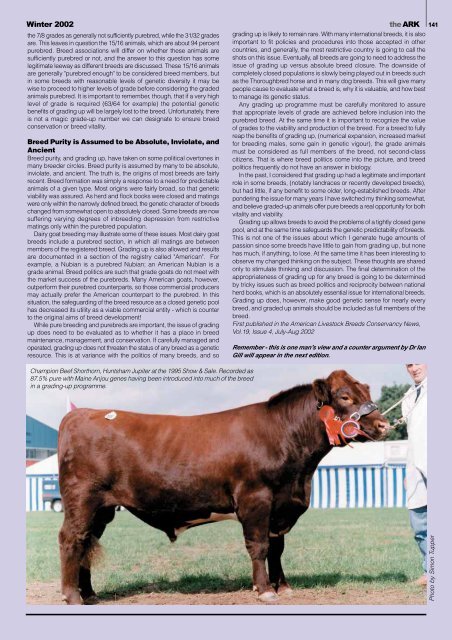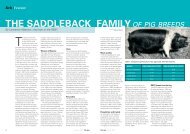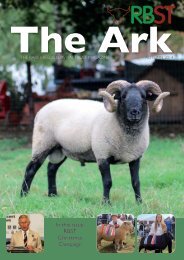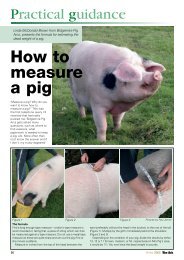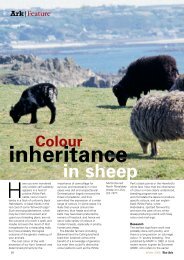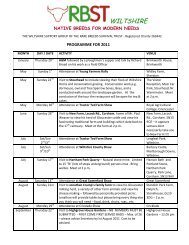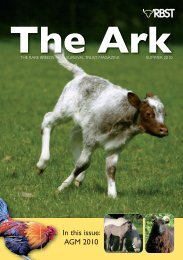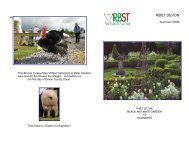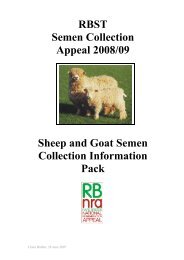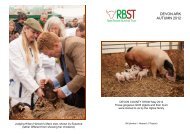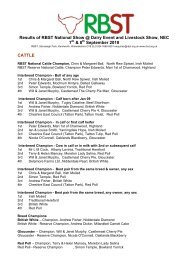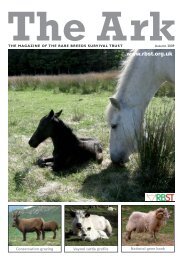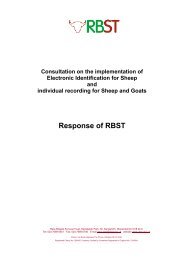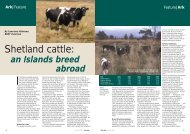Grading Up: Should We or Shouldn't We? - Rare Breeds Survival Trust
Grading Up: Should We or Shouldn't We? - Rare Breeds Survival Trust
Grading Up: Should We or Shouldn't We? - Rare Breeds Survival Trust
Create successful ePaper yourself
Turn your PDF publications into a flip-book with our unique Google optimized e-Paper software.
Winter 2002 the ARK 141<br />
the 7/8 grades as generally not sufficiently purebred, while the 31/32 grades<br />
are. This leaves in question the 15/16 animals, which are about 94 percent<br />
purebred. Breed associations will differ on whether these animals are<br />
sufficiently purebred <strong>or</strong> not, and the answer to this question has some<br />
legitimate leeway as different breeds are discussed. These 15/16 animals<br />
are generally "purebred enough" to be considered breed members, but<br />
in some breeds with reasonable levels of genetic diversity it may be<br />
wise to proceed to higher levels of grade bef<strong>or</strong>e considering the graded<br />
animals purebred. It is imp<strong>or</strong>tant to remember, though, that if a very high<br />
level of grade is required (63/64 f<strong>or</strong> example) the potential genetic<br />
benefits of grading up will be largely lost to the breed. Unf<strong>or</strong>tunately, there<br />
is not a magic grade-up number we can designate to ensure breed<br />
conservation <strong>or</strong> breed vitality.<br />
Breed Purity is Assumed to be Absolute, Inviolate, and<br />
Ancient<br />
Breed purity, and grading up, have taken on some political overtones in<br />
many breeder circles. Breed purity is assumed by many to be absolute,<br />
inviolate, and ancient. The truth is, the <strong>or</strong>igins of most breeds are fairly<br />
recent. Breed f<strong>or</strong>mation was simply a response to a need f<strong>or</strong> predictable<br />
animals of a given type. Most <strong>or</strong>igins were fairly broad, so that genetic<br />
viability was assured. As herd and flock books were closed and matings<br />
were only within the narrowly defined breed, the genetic character of breeds<br />
changed from somewhat open to absolutely closed. Some breeds are now<br />
suffering varying degrees of inbreeding depression from restrictive<br />
matings only within the purebred population.<br />
Dairy goat breeding may illustrate some of these issues. Most dairy goat<br />
breeds include a purebred section, in which all matings are between<br />
members of the registered breed. <strong>Grading</strong> up is also allowed and results<br />
are documented in a section of the registry called "American". F<strong>or</strong><br />
example, a Nubian is a purebred Nubian; an American Nubian is a<br />
grade animal. Breed politics are such that grade goats do not meet with<br />
the market success of the purebreds. Many American goats, however,<br />
outperf<strong>or</strong>m their purebred counterparts, so those commercial producers<br />
may actually prefer the American counterpart to the purebred. In this<br />
situation, the safeguarding of the breed resource as a closed genetic pool<br />
has decreased its utility as a viable commercial entity - which is counter<br />
to the <strong>or</strong>iginal aims of breed development!<br />
While pure breeding and purebreds are imp<strong>or</strong>tant, the issue of grading<br />
up does need to be evaluated as to whether it has a place in breed<br />
maintenance, management, and conservation. If carefully managed and<br />
operated, grading up does not threaten the status of any breed as a genetic<br />
resource. This is at variance with the politics of many breeds, and so<br />
Champion Beef Sh<strong>or</strong>th<strong>or</strong>n, Huntsham Jupiter at the 1995 Show & Sale. Rec<strong>or</strong>ded as<br />
87.5% pure with Maine Anjou genes having been introduced into much of the breed<br />
in a grading-up programme.<br />
grading up is likely to remain rare. With many international breeds, it is also<br />
imp<strong>or</strong>tant to fit policies and procedures into those accepted in other<br />
countries, and generally, the most restrictive country is going to call the<br />
shots on this issue. Eventually, all breeds are going to need to address the<br />
issue of grading up versus absolute breed closure. The downside of<br />
completely closed populations is slowly being played out in breeds such<br />
as the Th<strong>or</strong>oughbred h<strong>or</strong>se and in many dog breeds. This will give many<br />
people cause to evaluate what a breed is, why it is valuable, and how best<br />
to manage its genetic status.<br />
Any grading up programme must be carefully monit<strong>or</strong>ed to assure<br />
that appropriate levels of grade are achieved bef<strong>or</strong>e inclusion into the<br />
purebred breed. At the same time it is imp<strong>or</strong>tant to recognize the value<br />
of grades to the viability and production of the breed. F<strong>or</strong> a breed to fully<br />
reap the benefits of grading up, (numerical expansion, increased market<br />
f<strong>or</strong> breeding males, some gain in genetic vigour), the grade animals<br />
must be considered as full members of the breed, not second-class<br />
citizens. That is where breed politics come into the picture, and breed<br />
politics frequently do not have an answer in biology.<br />
In the past, I considered that grading up had a legitimate and imp<strong>or</strong>tant<br />
role in some breeds, (notably landraces <strong>or</strong> recently developed breeds),<br />
but had little, if any benefit to some older, long-established breeds. After<br />
pondering the issue f<strong>or</strong> many years I have switched my thinking somewhat,<br />
and believe graded-up animals offer pure breeds a real opp<strong>or</strong>tunity f<strong>or</strong> both<br />
vitality and viability.<br />
<strong>Grading</strong> up allows breeds to avoid the problems of a tightly closed gene<br />
pool, and at the same time safeguards the genetic predictability of breeds.<br />
This is not one of the issues about which I generate huge amounts of<br />
passion since some breeds have little to gain from grading up, but none<br />
has much, if anything, to lose. At the same time it has been interesting to<br />
observe my changed thinking on the subject. These thoughts are shared<br />
only to stimulate thinking and discussion. The final determination of the<br />
appropriateness of grading up f<strong>or</strong> any breed is going to be determined<br />
by tricky issues such as breed politics and reciprocity between national<br />
herd books, which is an absolutely essential issue f<strong>or</strong> international breeds.<br />
<strong>Grading</strong> up does, however, make good genetic sense f<strong>or</strong> nearly every<br />
breed, and graded up animals should be included as full members of the<br />
breed.<br />
First published in the American Livestock <strong>Breeds</strong> Conservancy News,<br />
Vol.19, Issue 4, July-Aug 2002<br />
Remember - this is one man's view and a counter argument by Dr Ian<br />
Gill will appear in the next edition.<br />
Photo by Simon Tupper


